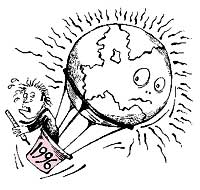Take heed!
 the phenomenon of global warming is surely not confirmed as yet. An area may have become warmer not because of an increase in global warming but because of certain natural variations. But whatever be the cause, it is time we took note.
the phenomenon of global warming is surely not confirmed as yet. An area may have become warmer not because of an increase in global warming but because of certain natural variations. But whatever be the cause, it is time we took note.
For Earth as a whole, 1996 ranked among the 10 warmest years, according to worldwide records of air temperatures on Earth's surface kept since the mid-19th century. American and British scientists, who pointed this out, also said that it was not quite as warm as the peak annual temperature recorded in 1995. The January '97 report issued by the National Aeronautics and Space Administration's Goddard Institute for Space Studies in New York ranked 1996 as the fifth-warmest ever. A second report by the British Meteorological Office and the University of East Anglia, Cambridge, uk, placed it eighth on the basis of preliminary data.
But temperature measurements taken from balloons placed above Earth's surface showed a slight global temperature drop in 1996, said James K Angell of the National Oceanic and Atmospheric Administration, us. So did measurements of global temperature taken from satellites, said John R Christy of the University of Alabama, Tuscaloosa, us.
The satellite data, which gives better global coverage but reflects temperatures throughout the atmosphere rather than at the surface, generally parallel the surface readings. On balance, however, balloons showed a lesser temperature than the satellites record: when influences on climate like volcanic eruptions and occasional warming of Pacific waters caused by El Nino are filtered out, said Christy, the satellite data reveals a warming rate.
New York served up some big regional surprises in 1996, even as this decade's familiar string of warm years continued globally. At the regional level, record precipitation soaked northeastern us and the Pacific northwest, making the year the seventh wettest in more than a century, despite a drought in the southwest. Not only Americans, but also Canadians and Europeans affirm that large expanses of their continents were chilly for a large part of the year, reversing a three decade pattern of warming. Despite the drop, scientists say that the 1990s remain the warmest decade on record, with the 1980s following as the second.
While experts on climate are still far from arriving at a complete understanding of the world's weather, they believe they can account for some of last year's changes. They say, for instance, that the cooling of North America and Europe was caused by natural shifts in atmospheric circulation that dictate the largescale movement of hot and cold air.
Many scientists agree that the rise over the last two decades is too small to be significant, especially since there are many gaps in the surface data, said Richard S Lindzen, an atmospheric scientist at the Massachusetts Institute of Technology.
The surface records show that the Earth has warmed by about one degree Fahrenheit (-17.2
Related Content
- The Year of Opportunity for a Sustainable Future
- Officials Heed to Modi's Ideas on Green Energy
- Gujarat Govt joins other states, says will not permit Field trials of GM food crops in the state
- Focus on waste management
- Odisha asks officials to ensure plastic national flags are not used
- AERB safety steps to take 2 more years
